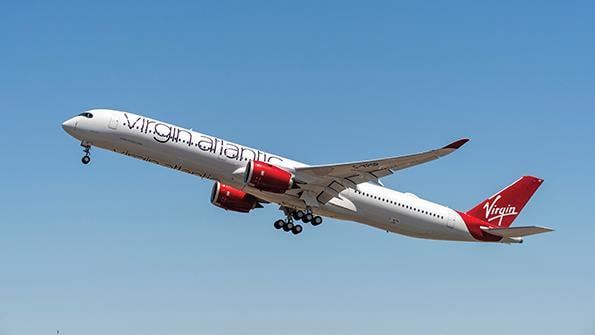
Virgin Atlantic’s fleet includes 10 Airbus A350-1000s, with two more scheduled for delivery in 2024.
UK long-haul carrier Virgin Atlantic is hoping for a return to profitability in 2024 after a few years of major change, including the UK’s exit from the European Union (EU), a significant restructuring and becoming a member of the SkyTeam global alliance.
“Belief, determination and conviction ensured our survival,” Virgin Atlantic CEO Shai Weiss said, reflecting on the airline’s rough ride through the pandemic. However, since then Virgin has cut £300 million ($380 million) from its annual cost base and is on track for a profitable 2024.
Weiss described 2023 as a “year of delivery,” and one of those deliverables was joining SkyTeam on March 2. Virgin had been tipped to join SkyTeam ever since it formed a joint venture (JV) with founding alliance member Delta Air Lines in 2012. Speculation intensified further when the Delta JV was extended to include SkyTeam heavyweights Air France-KLM.
“If we’ve learned anything over the last three years, it is that the strength of any individual, any company, is enhanced by partnerships,” Weiss said, when he announced the SkyTeam membership in September 2022.
Virgin Atlantic CCO Juha Jarvinen described joining SkyTeam as a “significant step” and work is ongoing to finalize loyalty and codeshare partnerships with Virgin’s fellow alliance members. “The compulsory element in alliances is the earn-and-burn [frequent flyer partnership] with all carriers. We do need to have that in place with all carriers by year-end 2023,” he said.

On the loyalty side, most of the larger airline tie-ups have already been completed. A partnership with China Eastern Airlines was completed in July, but Virgin still needs to establish reciprocal loyalty recognition with other airlines, like Italian carrier ITA. “Obviously, there is a question mark if they will remain SkyTeam or not, but we are in the process of finalizing the smaller carriers by year-end,” Jarvinen said.
COMMERCIAL BENEFITS
While codesharing with other SkyTeam members is not compulsory, this is an area where Jarvinen sees commercial benefits, so he is actively exploring “all of them” to see if they add value. Virgin finalized a codeshare with Korean Air in spring 2023 and another with China Eastern is “in the final stages.”
“The main benefit for us—beyond the joint venture with Air France-KLM and Delta—is the fact that we’ve now expanded our partnerships in Asia, where our natural footprint until now has been quite limited,” he told ATW. This means the Korean Air and China Eastern codeshares are significant, because they strengthen Virgin’s presence in markets where it previously had “limited exposure.”
Virgin has a network of 31 destinations, spanning China, India, Israel, Nigeria, Pakistan, South Africa and the US. Virgin’s Asian network is currently limited to Delhi, Islamabad, Lahore, the Maldives, Mumbai and Shanghai.
Jarvinen said a few other codeshares should be finalized by year-end, but he declined to comment on which airlines Virgin is negotiating with. The carrier already has codeshares with SkyTeam members Aeromexico, Middle East Airlines (MEA) and Korean Air, as well with non-SkyTeam airlines Air New Zealand, Indigo, LATAM, Singapore Airlines and WestJet.
Virgin has not withdrawn from any markets because of its SkyTeam membership, but Jarvinen said it will influence future network decisions.
“We firmly believe that, wherever we fly to, partnerships at the other destination are crucially important, as we are a smaller carrier with no shortfall feed. So, it will impact our decision-making going forward, but we have not seen a need to leave any of our current destinations,” he said.
At the same time, Virgin will continue to explore its own opportunities, such as in premium leisure demand, which has triggered seasonal services to the Maldives, Turks and Caicos, and Dubai this winter. However, Jarvinen said the “year-round, core airline network” will be based on partnerships.
SEOUL SEEKER
Meanwhile, Virgin is waiting on news of another opportunity that could further strengthen its Asian presence. Korean Air is planning to buy its national rival, Asiana Airlines, and Virgin stands to acquire remedy slots at Seoul Incheon if the deal goes ahead. This would pave the way for Virgin to open a new London Heathrow-Seoul route, in cooperation with its new SkyTeam ally.
However, while the UK has cleared the Korean-Asiana acquisition, the European Commission raised objections to the tie-up in May 2023, citing competition concerns on some Europe-South Korea routes. Korean has filed documents to address those concerns.
“As soon as that merger completes, then we have access for a daily slot at Heathrow and equally at Seoul Incheon,” Jarvinen said. “But we cannot benefit from it before the actual merger completes. So therefore, in terms of planning for Virgin Atlantic entry to Seoul, we are currently evaluating that and probably the earliest will be in 2025.”
Virgin is continuing to focus its London operations on Heathrow, after suspending flights from Gatwick during the pandemic. “We have no active plans to return to Gatwick,” he said.
ATW understands that Virgin has reduced its Gatwick slot portfolio from 11 to seven pairs, which are leased out to other airlines. Virgin may ultimately return to Gatwick, given that Heathrow is heavily constrained, but this is not in the cards yet. Concentrating operations at Heathrow and Manchester in northwest England has also improved Virgin’s operational efficiency.
“The focus is to maintain and gain more slot access at Heathrow,” Jarvinen explained. At the release of its 2022 results, Virgin announced that it had acquired three Heathrow slot pairs last year. ATW understands these three pairs came from Dutch carrier KLM, and one of those will be available for use by Virgin from 2024.
“There have always been a few [slot] offers on the tables, so we are actively exploring options to acquire more. There is nothing more that I can confirm, but there are some slots in the market,” Jarvinen said.
BREXIT IMPACT
As a long-haul carrier operating from the UK, Virgin no longer benefits from long-haul traffic rights negotiated by the EU since Brexit was finalized.
“We have not seen any impact from Brexit, in terms of traffic rights, or our access to opportunities for any further rights,” Jarvinen said. The UK is independently negotiating traffic rights around the world and Virgin has had a “very positive dialogue” with the UK Department for Transport.
The only “marginal” impact is that Virgin can no longer codeshare on direct EU-US flights that do not touch the UK. This means that an Air France flight between Paris and New York cannot operate under a Virgin flight number. However, Virgin can still sell seats on the flight. The JV with Air France is also “metal neutral,” so Virgin still gains revenue from the ticket sale; only the flight number is affected.
Some airlines, like LCCs easyJet, Ryanair and Wizz Air, have managed the post-Brexit landscape by setting up both UK and EU air operator’s certificates (AOCs); however, this is not something Virgin is considering.
“We are focusing on the UK, and we have no plans to seek a European AOC. We believe that there are a number of routes and a number of opportunities out of the UK that we will pursue in the next few years. Therefore, we have no active plans to seek any other AOCs in any other jurisdiction,” Jarvinen said.
Jarvinen is keen to secure additional rights from the UK to growth markets, particularly India. “There have been negotiations between the UK and India this year,” he said. “That’s the fastest-growing large economy. And obviously, UK and India have natural significant links to one another. UK-India is currently restricted, in terms of frequencies to Delhi and Mumbai, so we are actively influencing the UK to negotiate more [Indian] traffic rights. And, of course, the African continent and South American continent overall are future growth opportunities.”
Virgin has already detailed plans to launch a third Indian destination, Bangalore, in March 2024. Since 2019, Virgin has grown its Indian capacity by 250%, making this the airline’s largest growth market outside the US. In Africa, Virgin has the scope to leverage its SkyTeam partnership with Kenya Airways. Other destinations are also under evaluation, building on its existing services to Nigeria (Lagos) and South Africa (Cape Town and Johannesburg). Finally, Virgin has announced its first Latin America service—a daily São Paulo route that will start operating in May next year.
PILOT TRAINING & FLEET PLANS
One of Virgin’s focus areas as it gears up for growth will be securing enough pilots to optimize its flying program. Like other airlines, Virgin has suffered from pilot shortages, but crews are currently being trained and the airline will be “fully ramped up” by 2024.
“Therefore, we will be able to utilize all our aircraft to the maximum opportunity. That’s the focus for us in 2024, to have all our aircraft in full production, no longer having any pilot training restrictions,” Jarvinen said.
By this fall, Virgin will be back at 2019 capacity in terms of ASKs, which is significant, considering the closure of the Gatwick operation, a transition from Boeing 747s to smaller aircraft, and four fewer aircraft overall. Today, Virgin’s fleet comprises 10 Airbus A330s, four A330-900s, 10 A350-1000s and 17 Boeing 787-9s, with another four A330-900s and two A350s scheduled to arrive by the end of 2024, completing the airline’s current orderbook. These will replace older A330s.
Jarvinen said the fleet is “pretty settled,” with no new aircraft orders in the pipeline. “We’re currently at 41 aircraft and we’re building to 46 by year-end 2025.”
Virgin has options on a further eight A330-900s, potentially increasing this type to 16 aircraft, but no decision has been taken yet on these options.
“We are also now starting to work on the network plan, beyond 2025. And again, it depends on slot availability as well,” Jarvinen said. “So, it’s [based on] dimensions of network opportunities and slot access. So hopefully, in the next 12 months, we will have more clarity on the next steps. These [eight A330-900] options will secure enough growth for us for the foreseeable future.”
The airline’s current four-year strategic plan runs from 2022 to 2026. In 2023—year two of the plan—underlying EBITDA is expected to reach a record high, paving the way for profitability in 2024. This was originally anticipated in 2023, but the weak pound, persistent high inflation, fuel prices and rising interest rates led to a 2022 underlying loss of £206 million, before taxes and exceptional items, Jarvinen said.
“Really, the core focus is to reach profitability by 2024, and then build on top of that, but there will be no massive shifts or changes of direction because we believe that the strategy that we’ve chosen is the right one.”





